
Journal of Substance Use & Addiction Treatment
Scope & Guideline
Connecting science and practice for impactful change.
Introduction
Aims and Scopes
- Substance Use Disorders and Treatment Modalities:
The journal emphasizes research on various substance use disorders, particularly focusing on opioid use disorder (OUD), alcohol use disorder, and polysubstance use. It explores treatment modalities including medication-assisted treatment (MAT), behavioral therapies, and harm reduction strategies. - Implementation Science and Health Services Research:
A core area of focus is on the implementation of evidence-based practices within healthcare systems, including barriers and facilitators to treatment access. Research often examines the efficacy of interventions in real-world settings, particularly in underserved populations. - Social Determinants of Health and Disparities:
The journal highlights the impact of social determinants of health on substance use and treatment outcomes, addressing issues of racial, ethnic, and socioeconomic disparities in access to care and effectiveness of interventions. - Innovative Approaches to Treatment:
There is a consistent focus on novel therapeutic approaches, including the use of technology (such as telehealth), community-based interventions, and culturally tailored programs aimed at enhancing treatment engagement and retention. - Peer Support and Recovery Models:
The journal recognizes the importance of peer support and recovery-oriented practices, exploring the roles of peer recovery coaches and community support systems in facilitating recovery from substance use disorders.
Trending and Emerging
- Telehealth and Digital Interventions:
With the rise of telehealth, particularly during and after the COVID-19 pandemic, there is an increasing focus on digital interventions for substance use treatment. Research is exploring the efficacy, accessibility, and patient satisfaction associated with remote care models. - Harm Reduction Strategies:
There is a growing emphasis on harm reduction approaches, including the use of naloxone distribution, supervised consumption sites, and mobile health units. This trend reflects a broader acceptance of harm reduction as a critical component of substance use treatment. - Racial and Ethnic Equity in Treatment:
Research investigating racial and ethnic disparities in treatment access and outcomes is gaining traction. This includes studies that analyze barriers faced by marginalized groups and explore culturally competent treatment models. - Community-Based Participatory Research (CBPR):
Emerging themes include community engagement and participatory research models that involve stakeholders in the research process, ensuring that the interventions are culturally relevant and address the specific needs of the community. - Addressing Co-Occurring Disorders:
An increasing body of research is focusing on the intersection of substance use disorders with mental health issues, recognizing the need for integrated treatment approaches that address both simultaneously.
Declining or Waning
- Traditional Abstinence-Based Models:
Research focusing solely on abstinence-based treatment models has become less frequent, as the field increasingly embraces harm reduction and integrated care approaches that prioritize patient-centered outcomes over strict abstinence. - Single-Sector Approaches:
There is a noticeable decline in studies that examine substance use treatment in isolation from other health services. The trend is shifting towards integrated care models that address co-occurring mental health issues and chronic diseases alongside substance use. - Generalized Treatment Protocols:
Research on generalized or one-size-fits-all treatment protocols is waning in favor of studies that emphasize tailored and individualized treatment plans that consider the unique needs and contexts of diverse populations. - Focus on Non-Opioid Substances:
While opioid use disorder remains a primary focus, there has been a decline in the volume of research specifically dedicated to non-opioid substances, such as cocaine and methamphetamine, in comparison to the extensive literature on opioids.
Similar Journals

Addiction Science & Clinical Practice
Unlocking the potential of addiction science for all.Addiction Science & Clinical Practice is a premier open-access journal dedicated to advancing the understanding and treatment of addiction through evidence-based research and clinical practice. Published by BMC in the United Kingdom since 2007, this journal has significantly impacted the fields of Clinical Psychology, Medicine, and Psychiatry and Mental Health, proudly securing a Q1 ranking in multiple categories as of 2023. With an emphasis on high-quality research, the journal provides an inclusive platform for the dissemination of innovative findings and clinical insights that address the complexities of addiction. Researchers, practitioners, and students alike benefit from its unrestricted access since 2012, allowing for widespread dissemination of knowledge. Located at CAMPUS, 4 CRINAN ST, LONDON N1 9XW, the journal continues to lead the way in fostering collaboration and informing best practices in addiction science.
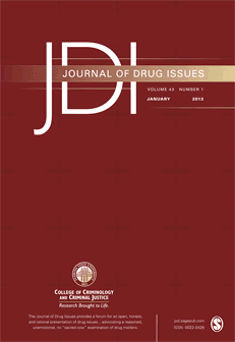
JOURNAL OF DRUG ISSUES
Navigating the Nuances of Drug IssuesJOURNAL OF DRUG ISSUES, published by SAGE PUBLICATIONS INC, serves as a pivotal platform for researchers and professionals dedicated to the multifaceted exploration of drug-related topics across various fields, including health, medicine, psychiatry, and public health. With an ISSN of 0022-0426 and an E-ISSN of 1945-1369, this esteemed journal has maintained a consistent output since its inception in 1971 and is set to continue its contributions through 2024. Reflecting its high academic standards, it has achieved a Q2 ranking in Health (Social Science) and Q3 rankings in several related categories, underscoring its relevance and influence among scholarly work. The journal is indexed in Scopus, with respectable rankings in various medical and health-related disciplines, highlighting its role as an essential resource for those invested in the vigorous discourse surrounding drug issues. Although not an open-access publication, the journal ensures that access to its extensive research findings remains available to a broad audience, solidifying its importance in advancing knowledge and informing best practices in the field.

Substance Abuse Treatment Prevention and Policy
Leading the charge in substance abuse treatment and prevention.Substance Abuse Treatment, Prevention, and Policy is a premier open access journal published by BMC, dedicated to advancing the understanding and improvement of substance abuse treatment and prevention strategies. Since its inception in 2006, this journal has established itself as a significant resource in the fields of Health Policy and Psychiatry and Mental Health, proudly maintaining a strong reputation reflected in its 2023 Scopus rankings, which place it in the top quartiles of these categories. With an impactful focus on policy implications and evidence-based practices, the journal's comprehensive coverage supports the sharing of innovative research and perspectives aimed at mitigating substance abuse challenges worldwide. Open access since its launch, it ensures that vital research is readily available to researchers, practitioners, and students alike, facilitating collaboration and discourse in this critical area of public health. Its commitment to high-quality research is underscored by its rankings within the 78th percentile for Health Policy and 66th percentile for Psychiatry and Mental Health, highlighting its influence and relevance in addressing pressing issues in substance misuse.
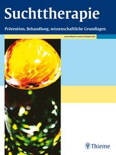
Suchttherapie
Transforming Therapeutic Approaches to AddictionSuchttherapie, an esteemed journal published by GEORG THIEME VERLAG KG, serves as a critical platform within the fields of Applied Psychology and Psychiatry and Mental Health. Established in 2000 and continuing through 2024, this journal is committed to advancing the understanding and treatment of addiction and related psychological issues. Although it currently stands in the Q4 Quartile ranking and is categorized as low percentile in both Scopus Ranks and impact metrics, its significance lies in its dedication to disseminating cutting-edge research and clinical findings that contribute to the evolving landscape of therapeutic practices. Published in Germany, the journal facilitates unlimited access to the vital discourse surrounding mental health and addiction treatment, making it a valuable resource for researchers, professionals, and students alike seeking to enhance their knowledge and skills in this important area of study. As the field continues to grow, Suchttherapie plays a pivotal role in bridging practice with academic rigor, ensuring that readers remain informed on the latest methodologies and insights.
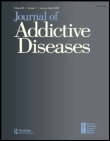
JOURNAL OF ADDICTIVE DISEASES
Uncovering Innovations in Addiction StudiesJOURNAL OF ADDICTIVE DISEASES, published by ROUTLEDGE JOURNALS, TAYLOR & FRANCIS LTD, serves as a pivotal platform for researchers, clinicians, and students in the realms of clinical psychology, psychiatry, and addiction studies. With a distinguished history dating back to its inception in 1991, this journal spans critical research developments with its current scope covering converged years from 2018 to 2024, ensuring a robust repository of knowledge. Notably, it holds a respectable impact factor and is categorized in Q2 quartiles across several disciplines including Clinical Psychology, Medicine (miscellaneous), and Psychiatry and Mental Health for 2023, reflecting its impactful contributions to the scientific community. Despite the journal not currently offering Open Access, it remains highly ranked, occupying positions in the top percentiles of Scopus rankings. This journal emphasizes the importance of disseminating high-quality research focused on addictive behaviors and diseases, thereby addressing vital clinical and public health challenges.
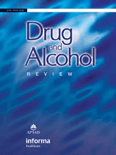
DRUG AND ALCOHOL REVIEW
Exploring the complexities of drug and alcohol research.DRUG AND ALCOHOL REVIEW, published by Wiley, is a leading journal dedicated to advancing the scholarship in the fields of drug and alcohol research. Since its inception in 1989, this esteemed publication has provided a critical platform for the dissemination of innovative research findings, reviews, and theoretical papers, addressing pressing issues in substance use and addiction. With an impact factor that places it in the Q1 category in both Health (social science) and Medicine (miscellaneous), it ranks #78 out of 371 in the Scopus index for Health and #115 out of 398 in Medicine, reflecting its significant influence and high citation rates among scholars. The journal is committed to fostering a multidisciplinary approach, integrating perspectives from psychology, sociology, public health, and medicine, to inform policy and practice. Accessible to researchers and practitioners alike, *DRUG AND ALCOHOL REVIEW* serves as an essential resource for anyone invested in understanding and addressing the complexities of drug and alcohol use in society.

Current Addiction Reports
Elevating addiction research to new heights.Current Addiction Reports, published by SPRINGERNATURE, is a leading journal dedicated to the comprehensive study of addiction in its various dimensions, with a particular focus on the latest clinical developments and research in Clinical Psychology and Psychiatry and Mental Health. Since its inception in 2014 and through to 2024, the journal has established itself as a pivotal resource for researchers, professionals, and students alike, currently holding a prestigious Q1 ranking in both relevant categories. With an impressive Scopus rank of #46 in Clinical Psychology and #129 in Psychiatry and Mental Health, it occupies a significant position within the field, reflecting its commitment to high-quality scholarship and impactful findings. The journal offers open access options, ensuring that vital research is readily available to a global audience. By fostering a deeper understanding of addiction trends and innovative treatment methodologies, Current Addiction Reports plays an essential role in advancing knowledge and improving clinical practices.
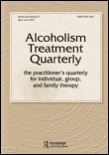
Alcoholism Treatment Quarterly
Empowering Research in Alcoholism Treatment and RecoveryAlcoholism Treatment Quarterly is a reputable journal dedicated to advancing the understanding of alcohol use disorders and their treatment. Published by Routledge Journals, Taylor & Francis Ltd, this journal has established itself as an essential resource within the fields of Medicine and Psychiatry and Mental Health, evidenced by its placement in the Q3 category for both disciplines in 2023. With a comprehensive scope covering the multifaceted aspects of alcoholism treatment, the journal serves as a vital platform for researchers, clinicians, and students to share and access high-quality, peer-reviewed articles. Although it is not an open-access journal, it is widely recognized for its contribution to the field, having been in continuous publication since 1984 and looking forward to its 40th anniversary in 2024. The journal aims to promote evidence-based practices and foster discourse on innovative treatment methods and research trends, making it an indispensable asset for anyone involved in the prevention and treatment of alcohol-related issues.
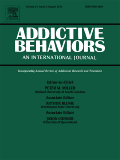
ADDICTIVE BEHAVIORS
Transforming Perspectives on Addiction and Mental HealthADDICTIVE BEHAVIORS is a prestigious journal published by PERGAMON-ELSEVIER SCIENCE LTD, specializing in the critical examination and exploration of addiction-related issues across diverse fields including Clinical Psychology, Psychiatry and Mental Health, and Toxicology. With a robust history dating back to 1975 and convergence extending to 2024, the journal is esteemed for its rigorous peer-reviewed research that contributes significantly to understanding addiction phenomena. Ranked in the Q1 category for its focus areas, it stands out within the academic community, evidenced by its impressive Scopus rankings—25th in Clinical Psychology and 14th in Toxicology—placing it in the top tier of its disciplines. This journal offers valuable insights into addiction behaviors, treatment methodologies, and public health implications, making it an essential resource for researchers, practitioners, and students seeking to advance their knowledge and impact the field. Although not Open Access, it provides vital access options for institutions and individuals invested in addiction studies.

Alcohol Research-Current Reviews
Connecting researchers with vital alcohol research findings.Alcohol Research-Current Reviews is a pivotal journal dedicated to advancing the understanding of alcohol-related issues and promoting scientific discourse in the fields of addiction and public health. Published by the National Institute on Alcohol Abuse and Alcoholism, this journal serves as a comprehensive platform that consolidates contemporary reviews on a wide array of topics related to alcohol, including its biological effects, societal implications, and prevention strategies. Despite its coverage in Scopus being discontinued, the journal remains a respected resource among researchers and practitioners, supporting the dissemination of important findings and fostering ongoing education in alcohol research. The open access option ensures that valuable research is readily available to an expansive audience, further enhancing the journal's impact in the academic community. With a ISSN of 1535-7414 and E-ISSN 1930-0573, the journal is committed to providing high-quality, peer-reviewed content that informs and influences public policy and health interventions.